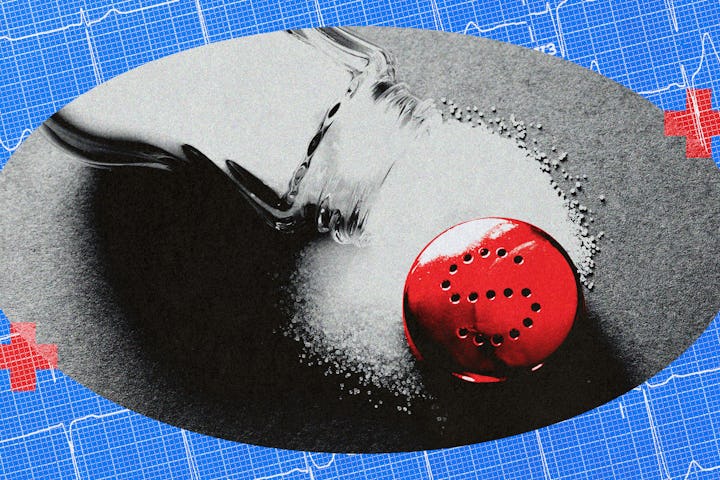One Tiny Change To Your Diet Can Slash Your Blood Pressure
You don’t have to overhaul your diet.

High blood pressure is the leading cause of disease and death in the U.S. — as it can lead to heart failure, heart attack, and stroke. Luckily, you don’t have to overhaul your diet to lower your blood pressure. A new study shows that one tiny change can have a big impact: eating less salt.
For the new study, published in JAMA, researchers assigned 213 participants aged 50 to 75 to eat either a high-sodium or low sodium-diet — meaning eating an additional 2,200 mg of sodium per day compared to their usual (by eating two bullion packets), or eating a total of 500 mg per day. (The American Heart Association recommends eating no more than 2,300 mg of sodium per day, and ideally limiting it to less than 1,500 mg per day.) They followed that diet for one week, then switched to the other diet for a week. The participants, who lived in either Chicago or Birmingham, Alabama, included people with a range of blood pressures and those who were and were not taking blood pressure medication.
The researchers found that decreasing how much sodium you eat by just one teaspoon per day reduces systolic blood pressure by an amount comparable to high blood pressure drugs. “The result was a decline in systolic blood pressure by about 6 millimeters of mercury (mmHg), which is comparable to the effect produced by a commonly utilized first-line medication for high blood pressure,” Deepak Gupta, M.D., an associate professor of medicine at Vanderbilt University Medical Center and co-principal investigator, said in a press release.
This blood pressure-lowering effect of eating less salt was seen quickly, in just a week. Despite the speed of the change, the study authors said that this rapid effect was safe.
“The decreases in blood pressure we observed could have a major impact on an individual’s future risk of heart disease and death; prior studies have shown that every 5 mm Hg lower blood pressure significantly reduced the risk for all-cause mortality by up to 8%,” co-principal investigator Norrina Allen, Ph.D., a professor of preventive medicine at Northwestern University Feinberg School of Medicine, said at an American Heart Association conference presentation.
Cutting salt to reduce blood pressure doesn’t work for everyone, but it does for most people. “We found that 70-75% of all people, regardless of whether they are already on blood pressure medications or not, are likely to see a reduction in their blood pressure if they lower the sodium in their diet,” Allen said in the press release.
Importantly, this is the first study to show that eating less salt can lower the blood pressure of people already taking hypertension drugs. “We previously didn’t know if people already on blood pressure medication could actually lower their blood pressure more by reducing their sodium,” Allen said.
“The effect of reduction in dietary sodium on blood pressure lowering was consistent across nearly all individuals, including those with normal blood pressure, high blood pressure, treated blood pressure and untreated blood pressure,” Gupta added.
Switching to low-sodium options of your favorite products — such as canned soups, soy sauce, and bottled salad dressings — is an easy way to eat less sodium. Opting for fresh foods over packaged foods can help too, as can using more herbs and spices to season your dishes rather than relying on salt. Eating certain foods can also lower your blood pressure, including bananas, unsalted almonds, and oats. Also, crucially, limiting how often you eat out can significantly lower your salt intake.
“People have a real shot at improving their health by modifying their diet in this way,” co-investigator Cora Lewis, M.D., a professor and chair of the department of epidemiology and professor of medicine at the University of Alabama at Birmingham, said in the press release.
As Fatherly previously reported, men with high blood pressure should put a serious focus on their fitness because it is linked to a lower chance of dying from a cardiovascular event. And one unexpected type of exercise — isometric exercise, a form of strength training in which you’re stationary, holding a position such as plank or dead hang — is the best for lowering blood pressure. One isometric exercise in particular came up on top: wall sits.
This article was originally published on